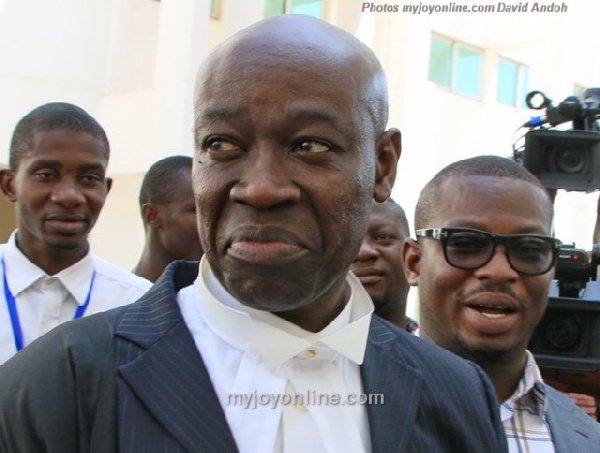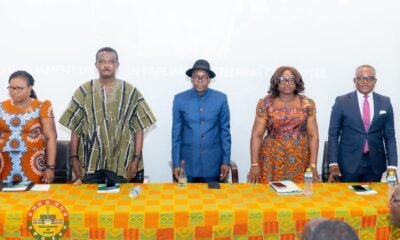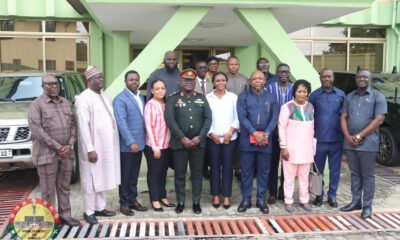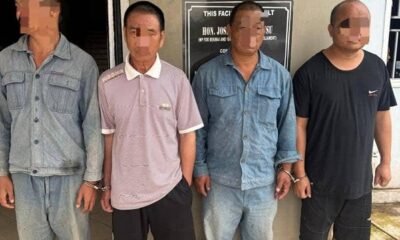News
To thine own self be true- Let the law work

On the evening of Tuesday, March 25, 2025, social media reports indicated that His Excellency, the President of the Republic of Ghana, had forwarded three petitions for the removal of the Chief Justice to the Council of State. This step is a constitutional requirement under Article 146(6) of the 1992 Constitution, which states:
1.“Where the petition is for the removal of the Chief Justice, the President shall, acting in consultation with the Council of State, appoint a committee consisting of two Justices of the Supreme Court, one of whom shall be appointed Chairman by the President, and three other persons who are not members of the Council of State, nor members of Parliament, nor lawyers.”
2.Two days later, at 9:20 AM on Thursday, March 27, 2025, the Hon. Vincent Ekow Assafuah of Old Tafo, in Kumasi filed an action at the Supreme Court challenging the President’s referral of the petitions to the Council of State.
3.Mr. Assafuah argues that the President is required, under Articles 146(1), (2), (4), (6) and (7), 23, 57(3), and 296 of the Constitution, to:
“…notify the Chief Justice about a petition for her removal and obtain her comments and responses before referring the petition to the Council of State or commencing consultation with the Council of State.”
4.This claim raises a number of intriguing questions:
i. How did Mr. Assafuah, within just one day, ascertain that the Chief Justice was not consulted before the petitions were referred to the Council of State?
ii. Did the Chief Justice personally inform him that she was not consulted?
iii. Was there any media report confirming that the Chief Justice had been bypassed in the process?
5.And Godfred Dame as his lawyer? As the musician Joseph of Culture says, “this is neither a jigsaw nor a puzzle.” Things are falling into place. We either survive together or perish together.
6. That aside, only Article 146(6) is relevant in determining whether the President was required to seek the Chief Justice’s comments before consulting the Council of State.
7.Article 146(6), in clear and unambiguous terms, states that when a petition concerns the removal of the Chief Justice, the President must act in consultation with the Council of State.
8.In Agyei Twum v. Attorney General & Akwetey, Justice Date-Bah, speaking for the Supreme Court, held that just like other Justices of the Superior Courts, a prima facie case must first be established against the Chief Justice before a committee is empaneled to investigate the petition.
9. However, the Agyei Twum case did not specify how the prima facie determination should be made. What is certain, however, is that the President must act in consultation with the Council of State. The President’s decision to refer the petitions to the Council of State is, therefore, in strict compliance with the Constitution.
10. The following questions expose the suit for what it is—Much Ado About Nothing:
i. If the Constitution explicitly states that “where the petition is for the removal of the Chief Justice, the President shall act in consultation with the Council of State”, is it unconstitutional for the President to refer the petitions to the Council of State?
ii. Isn’t the referral the first logical step in discussing the prima facie determination and the procedure for it?
iii. Should the President unilaterally decide on the petitions without engaging the Council of State, as mandated?
iv. Does referring the petitions to the Council of State amount to a prima facie determination without giving the Chief Justice a hearing?
v. Does this referral prevent the Chief Justice from later providing her comments on the petitions?
11. In the first petition, the former President’s response suggested that the Council of State had been consulted before the determination that no prima facie case had been made against the Chief Justice.
12. Yet, the President’s letter to Prof. Azar does not indicate that the Chief Justice was asked for her comments before that determination was made.
13. The Chief Justice believes in the law. There is no need for presumptive protection. Every Ghanaian believes in the law.
14. The law requires that the President act in consultation with the Council of State. That consultation is currently ongoing. Let the process unfold. The Council of State has its own esteemed legal minds—trust them as much as you have always asked us to trust you.
15. To Proxy Assafuah, let me offer a lesson from the Acts of the Apostles. In Acts 5, Peter and his fellow apostles faced intimidation aimed at silencing their mission. Yet, despite the threats, they persisted in preaching the gospel without seeking legal recourse.
16. When they were eventually arrested and brought before the High Priest, Gamaliel, a respected Pharisee, offered wise counsel:
17. He reminded his colleagues of Theudas and Judas, two men who falsely claimed divine backing but ultimately perished. Gamaliel then gave this timeless advice in Acts 5:38-39:
“…Refrain from these men, and let them alone: for if this counsel or this work be of men, it will come to nought: But if it be of God, ye cannot overthrow it; lest haply ye be found even to fight against God.”
18. So be it, Hon. Mr. Proxy! leave the petitioners alone for if their counsel or work be of men, their petitions will come to nought, but if it be of God, and their cause is just, no court action can overthrow it.
By Thaddeus Sory
Hot!
Speaker of Parliament inaugurates open Parliament Steering Committee, launches action plan

The Speaker of Parliament, Alban Sumana Kingsford Bagbin, has launched the Open Parliament Steering Committee and the Open Parliament Action Plan.
The ceremony was under the theme “Achieving Gender Equality: Action by Action.”
The Speaker highlighted the critical role Parliament plays in translating the will of the people into inclusive legislation, responsive policies, and accountable governance.
“The International Day of Parliamentarianism is worth celebrating, as it offers an opportunity not only to recognise and promote achievements in strengthening democratic governance, but also to pause and reflect on the remaining gaps in institutionalising parliamentary democracy,” he said.
He noted that the event was scheduled to coincide with the International Day of Parliamentarianism to reinforce the importance of open and inclusive governance.
The Majority Leader, Mahama Ayariga, stated that the International Day of Parliamentarianism is intended to recognise the vital role Parliaments play globally as pillars of democratic governance.
He noted that this marks the first time Ghana is formally observing the day.
“The gravity of our observance is further accentuated as we convene to witness the launch of the Open Parliament Action Plan by the Open Government Partnership Caucus,” he said.
Delivering a statement on behalf of the Minority Leader, Alexander Kwamena Afenyo-Markin, the Deputy Minority Leader, Patricia Appiagyei, described the Open Parliament Action Plan as a transformative initiative aimed at strengthening the relationship between Parliament and the public.
She said the plan represents a bold commitment to making Parliament more transparent, accessible, and responsive to the needs of Ghanaians.
The Clerk to Parliament, Mr. Ebenezer Ahumah Djietror, described the launch as a key milestone in the effort to build a citizen-focused and accountable Parliament.
He added that the International Day of Parliamentarianism is a call to action to recommit to the highest standards of public service and democratic accountability.
The inauguration was attended by a wide range of stakeholders, including the Majority and Minority Members of Parliament, members of the Open Parliament Steering Committee, the Open Government Partnership (OGP) Caucus, Parliamentary Network Africa, representatives from civil society organisations, members of the diplomatic corps, traditional and religious leaders, student bodies, the Parliamentary Press Corps, and other media partners.
Hot!
NACOC declares drug menace a national emergency

The Parliamentary Committee on Defence and Interior has paid a working visit to the Narcotics Control Commission (NACOC) to engage with its leadership and assess operational challenges hampering the fight against illicit drugs.
In a detailed presentation, Dr. Basha Ligbi, Head of the Commission’s Research Bureau, highlighted critical setbacks including broken body scanners at airport terminals, inadequate office infrastructure, overcrowded detention facilities, and deteriorating vehicles.
He also called for the Commission’s headquarters to be reclassified as a security zone, citing growing security risks due to private encroachment and nearby high-rise developments.
Director General of NACOC, Brigadier General Maxwell Obiba Mantey, described the escalating drug trade as a national emergency, warning that drug barons now rival armed robbers in threat level and are gaining influence at the highest levels.
He appealed for stronger institutional support and morale-boosting interventions to preserve the integrity of NACOC officers.
Chairman of the Committee and MP for Builsa North, James Agalga, assured the Commission of the Committee’s commitment to escalate the concerns to Parliament and engage key justice sector stakeholders to fast-track reforms in support of NACOC’s mandate.














